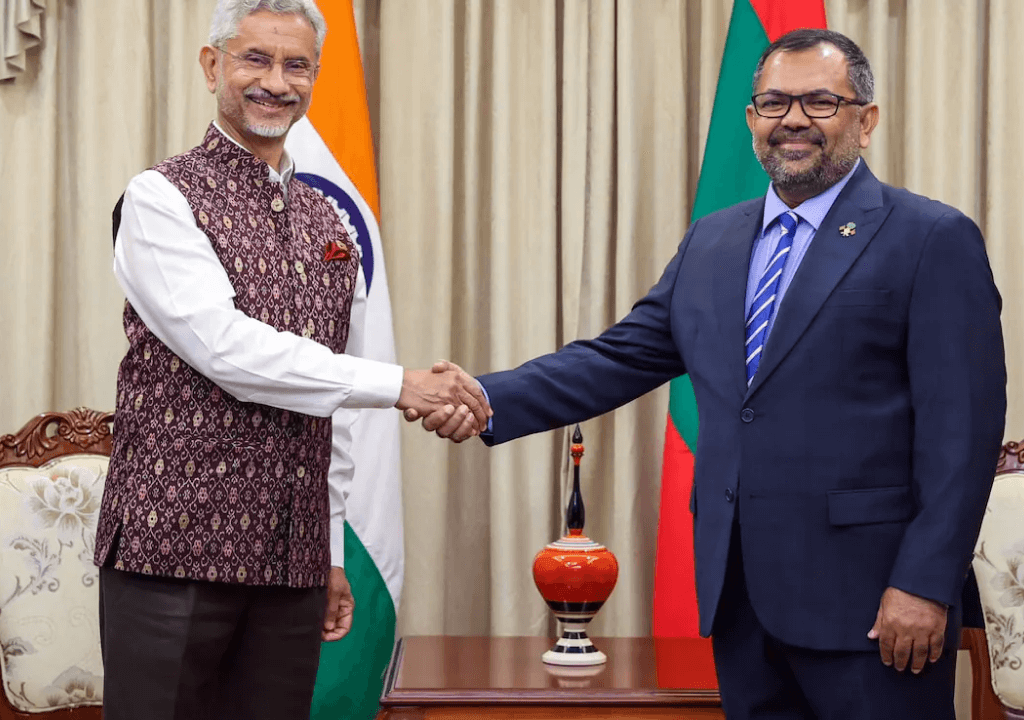Tiny islands, with limited resources and facing significant climate threats, cannot survive without the support of the mainland. The Maldives has come to realize this now. When tourism revenue was flowing, and China appeared strong, they believed they no longer needed India. However, they forgot that India is their best option for survival. Now, they are working to improve and rebuild their lost relationship with India. Before Malé transformed into a striking concrete block in the sea, Indian cities, especially Thiruvananthapuram and Kochi, served as their gateway to the world. While various interest groups, including Sri Lanka, sought to destabilize the islands through terrorist attacks, India provided security, allowing them to live peacefully. Today, they are once again seeking India’s support, much like a child who, after straying away with wealthy friends, ultimately realizes where true safety lies and returns to their family.
Maldives President Mohamed Muizzu, who rose to power last year on an “India Out” and pro-Islamic platform, and surrounded himself with politicians known for anti-India rhetoric, is now preparing for a diplomatic trip to New Delhi, according to his aides. This marks a significant shift for Muizzu, who had previously avoided the traditional ceremonial first overseas visit to New Delhi and, in April, ordered the withdrawal of a small Indian military contingent that had been operating reconnaissance aircraft provided by India. By May, the Maldives had signed a defense agreement with China. Additionally, the Maldives chose not to renew a 2019 hydrographic survey agreement with India and withdrew from several other cooperative agreements. Earlier this year, Maldivian deputy ministers were caught making derogatory remarks about Indian Prime Minister Narendra Modi and his efforts to boost tourism in Lakshadweep, a neighboring Indian archipelago.
While the Indian government remained silent, the backlash from Indian citizens was swift. Calls to boycott the Maldives spread, threatening the country’s tourism-dependent economy, which heavily relies on Indian visitors. Despite this, Muizzu stood firm, accusing critics of trying to “Bully” the Maldives. However, without Indian tourists, the Maldives faces a potential economic crisis.
President Muizzu’s planned visit to New Delhi could indicate a significant shift and a desire to repair relations. While it’s premature to label this a complete policy reversal, it certainly represents a positive step for India-Maldives ties. The recent resignation of two junior ministers who ridiculed Prime Minister Modi suggests that Muizzu is eager to foster a healthy relationship with New Delhi. However, this effort is unlikely to come at the expense of his pro-China stance. The Maldives cannot afford to deteriorate its relationship with China, especially given its substantial debt to the country, which is not easily repayable.
The Maldives urgently requires international support as it grapples with rising debt, declining revenue, and dwindling foreign reserves. Running a budget deficit, the island nation has been seeking external assistance and grants. Many worry that without a viable growth strategy, the Maldives could follow in the footsteps of Sri Lanka, which experienced a severe economic collapse two years ago. Last week, credit rating agency Moody’s downgraded the Maldives, indicating that default risks have markedly increased due to persistently low foreign exchange reserves. The agency also pointed out that the prospects for a rapid recovery look bleak.
For India, having a Chinese puppet on their maritime shore is unacceptable, so they are prepared to negotiate. Even before the announcement of the upcoming visit, both Malé and New Delhi signaled a desire to improve ties. Last month, India’s Foreign Minister S. Jaishankar visited Malé, marking the first high-level visit since Muizzu was elected. Jaishankar’s visit was followed by consultations between the two countries on joint defense projects and security in the Indian Ocean this month. Muizzu’s upcoming visit signals a softening of his anti-India stance. Many political experts believe this is part of a broader effort to improve China-India relations and reduce China’s influence in the Indian Ocean as China focuses more on the South China Sea. Nonetheless, this represents a positive move from the Maldives.








